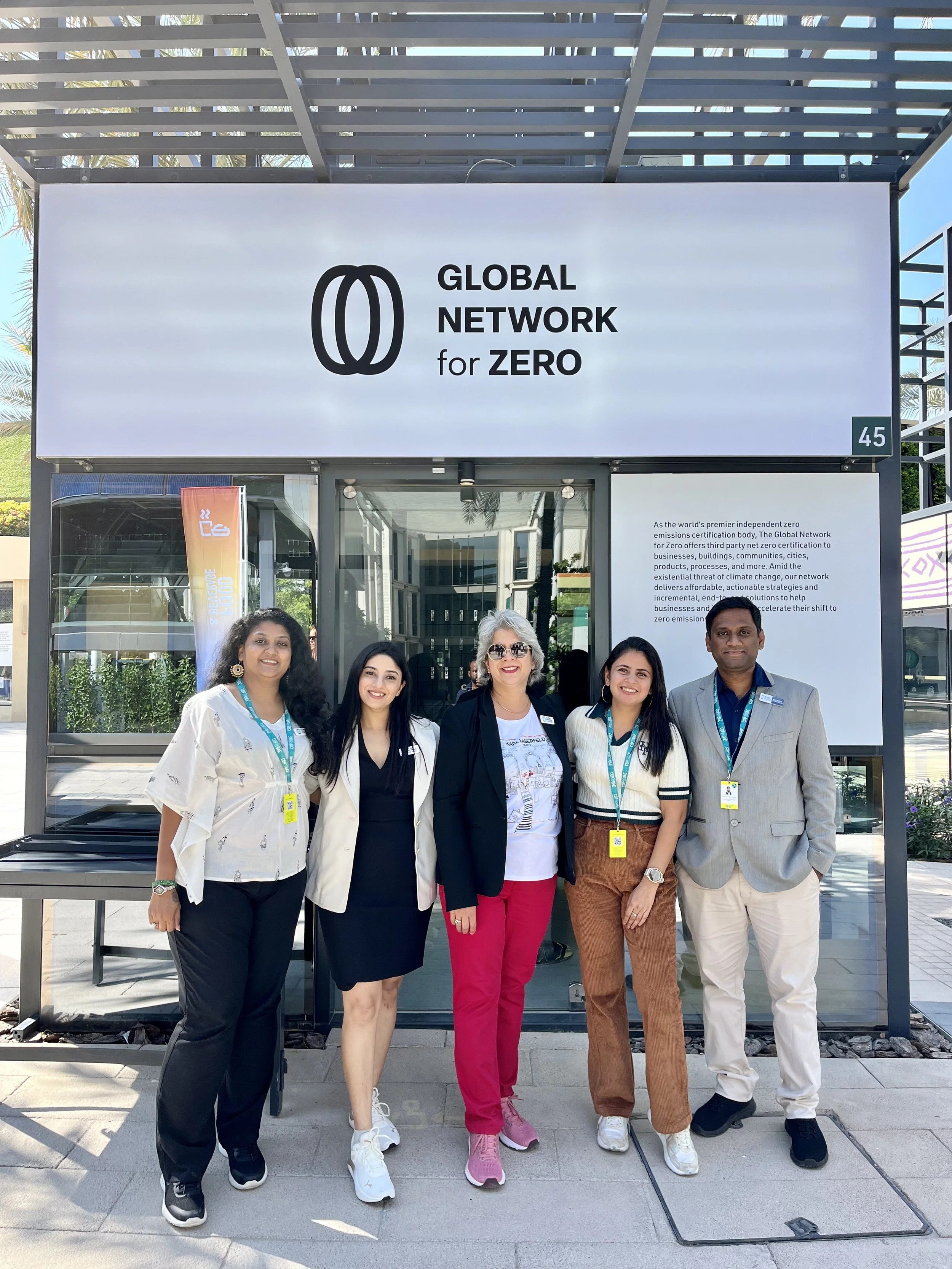GNFZ can help organizations with UAE Climate Law mandates
In the two years since the GNFZ team participated in COP28 in Dubai, we have been closely following the regulations development in the region. The sustainability landscape in the UAE has been swiftly evolving to keep the promises made during COP28, firmly establishing them as a sustainability leader in Middle East and Africa (MENA) region.
Members of the GNFZ team at COP28
The UAE’s Sustainability Journey
Driven by their commitment to sustainable development, alignment with global climate goals and the desire to attract responsible investment, the UAE is actively mandating and implementing ESG reporting and net zero initiatives. The UAE has set a net zero target by 2050, aiming to balance GHG emissions with removals. To meet this goal, the UAE is not only providing incentives for companies to adopt sustainable practices and align their operations with the country's sustainability vision, but also promoting sustainable finance to support its green economy agenda and encourage ESG-related investments.
The UAE's framework aligns with international standards like Global Reporting Initiative (GRI) and Task Force on Climate-related Financial Disclosures (TCFD), enhancing transparency and comparability. Key aspects include:
Mandating ESG disclosures for listed companies, requiring them to disclose information on their ESG practices.
Requiring business entities to monitor, report and verify their GHG emissions, including tracking emissions sources, quantities and reduction measures.
Expecting business entities to develop decarbonization strategies to reduce emissions and enhance their resilience to climate change impacts.
There are multiple sustainability regulations and initiatives the UAE has adopted over time to get to where they are today. This includes facilitating the adoption of sustainable finance and promote ESG principles via the UAE Sustainable Finance Working Group (SFWG), mandating ESG disclosures for public joint stock companies via the Securities and Commodities Authority (SCA), supporting sustainable finance via the Abu Dhabi Global Market (ADGM) ESG Framework and most importantly, the Federal Law no. 11 that places immediate requirements on high-emitting sectors to measure, reduce and report emissions.
The UAE’s Federal Decree - Law No. 11
Federal Decree - Law No. 11 (henceforth “The Law”) in the UAE pertains to various subjects depending on the year it was issued. In 2021, it concerned the “Regulation and Protection of Industrial Property Rights,” specifically patents and utility certificates. In 2023, it was about “Procurement in the Federal Government,” focusing on how federal entities conduct procurements. As of 2024, it focuses on the “Reduction of Climate Change Effects,” mandating emissions reporting and reduction strategies for businesses.
The Law addresses the reduction of climate change effects and applies to businesses in both free zones and mainland UAE. It requires businesses to measure, track and manage their GHG emissions. It also supports the UAE's goal of achieving climate neutrality by 2050. There are multiple challenges companies currently face to meet these mandates:
Establishing robust systems for collecting and reporting accurate emissions data.
Integrating decarbonization into business operations and embedding sustainability across all functions.
Building internal knowledge and expertise on ESG and sustainability reporting.
How GNFZ Can Help
GNFZ can help companies overcome all the challenges listed above and more. GNFZ certification and the law intersect strongly – both are grounded in measuring, tracking and implementing strategies to manage GHG emissions.
GNFZ is the world’s premier net zero certification body, offering certification to buildings, portfolios, businesses and more. GNFZ builds on accurate GHG accounting and targets to certify that a company is on a legitimate path to net zero, requiring companies to follow the GHG Protocol and science-based target methodologies. GNFZ is used by companies to certify their emissions reductions and net zero pathways meet global standards.
The major areas of intersection between the two include:
GHG emissions measurement and reporting: both systems demand rigorous, ongoing GHG accounting and transparent reporting.
The law requires all public and private companies to measure, report and track Scope 1, 2 and 3 GHG emissions.
GNFZ also mandates full Scope 1, 2 and 3 GHG emissions measurement and tracking, issuing interim certificates (assessment, planning, milestones and offsets) that culminate in full certification upon complete emissions elimination.
Strategies to reduce emissions: GNFZ’s net zero roadmaps overlay directly onto UAE’s mandated pathways.
Article 4 of the UAE law promotes energy efficiency, clean energy, carbon sinks, CCUS, fluorocarbon alternatives, offsets and integrated waste management.
GNFZ certification supports all of these — covering energy, emissions, water and waste — with flexible options such as offsets, CCUS, embodied emissions reduction and retrofits.
Capacity building and third-party verification: GNFZ net zero roadmaps as well as UAE mandated climate compliance roadmaps incrementally build capacity and encourage business collaborations.
The law empowers the Ministry and local authorities to define standards and controls, mandate reporting and enforce compliance with penalties for violation.
GNFZ provides third-party, independent certification — platform-based, sector-agnostic and verified — and supports capacity building along the way.
Compliance, recognition and global standards: GNFZ certifications not only aid UAE legal compliance but also embed organizations in global best practices and ESG frameworks.
The law enforces legal compliance with penalties (AED 50,000 – AED 2,000,000), while also enabling participation in carbon credit markets via a national registry.
GNFZ aligns with global frameworks (GHG Protocol, Paris Agreement, SBTi and ISO), supports carbon-credit approaches and its certifications are recognized in ESG reporting (e.g. GRESB).
Incremental, phased approach: GNFZ’s incremental pathways meet legal phasing of UAE Law, making GNFZ a practical tool for UAE entities implementing compliance in phases.
The law includes phased timelines (entry into force May 30, 2025; adjustment period thereafter).
GNFZ’s model is incremental by providing third party validated certificates at each stage (assessment → plan → implementation and offsets → zero), thus enabling organizations to align stepwise with the legal timeline.
All these intersections go on to illustrate how GNFZ’s incremental pathways help organizations meet the law.
Transforming the Climate Landscape
The UAE is actively transforming its climate landscape through mandatory ESG reporting and net-zero initiatives, and GNFZ’s net zero certifications are well-aligned with UAE’s Federal Decree - Law no. 11. GNFZ certification offers a turnkey solution that:
Meets the legal requirements for measurement, reduction, reporting and verification.
Supports all approved mitigation pathways,
Offers third-party credibility, ESG recognition and support for offsets.
Adapts through an incremental compliance journey, ideal for phased regulatory roll-out.
In short, GNFZ can help UAE-based organizations go beyond compliance, engage in carbon registry systems and align with global sustainability standards—all while avoiding legal penalties.
Set up a call with the GNFZ team to learn more about how our certification can help your company reach net zero.


